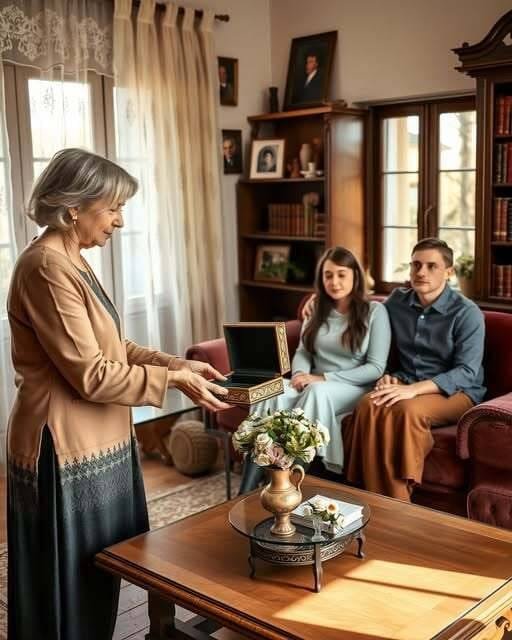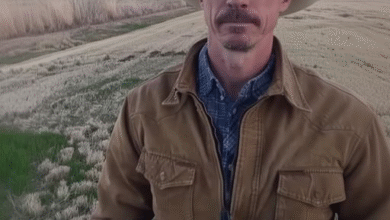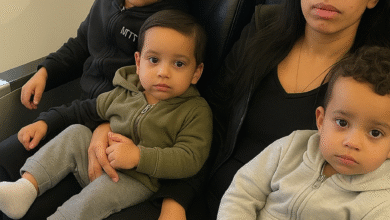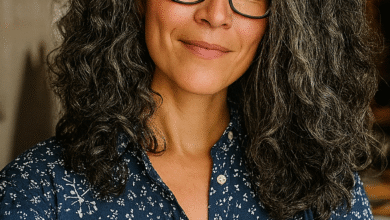My Son Was My Lifelong Companion—But After His Marriage, We Became Strangers.

My son was my best friend, my confidant, and my support throughout life. Javier was always kind, respectful, and eager to help. As a child and as a grown man, he remained my constant. We used to sit and talk for hours in my modest Andalusian countryside home. We shared dreams, encouraged each other, and I always gave him space when he needed it.
But everything changed when Lucía entered the picture.

For their wedding, both families contributed to buy them a refurbished apartment in downtown Valencia. I never visited it, but Javier showed me photos: white walls, modern furniture, a cozy atmosphere. After I was widowed and left with little money, I gave them most of the family jewelry—gold necklaces, rings, and earrings. I even encouraged Lucía to repurpose them into something new. I just wanted to help them start their life together.
But from the beginning, Lucía showed her true colors. On the surface, she was charming. Underneath, calculating. I remember seeing her silently count the money envelopes from the wedding, scrutinizing each one. I sensed danger. Ambition can be a good thing—but with women like her, it becomes something else. Too many wives today see their husbands as walking wallets. They spend endlessly, and in the end, take half in a divorce. That terrified me.
Six months later, Lucía said they were postponing children. “It’s impossible in such a small place,” she explained. “Taking out a mortgage would be madness, and Javier isn’t even a director yet.” It all sounded reasonable, but to me, it was all about numbers. Later, she proposed something that left me speechless: “Why don’t we sell your home, buy you a studio apartment, and use the rest of the money to move into a larger place? Then we can think about having kids.”
Can you see it? Her plan was to shove me into a 40-square-meter box so she could pocket the rest. And maybe later, even that studio would be at risk, and I’d be pushed into a nursing home. I briefly considered it if they were willing to support me with a fixed monthly amount. But with someone like Lucía? Never. I started sleeping with my handbag under the pillow—just in case.
Javier tried to convince me. “Why do you need so much space, Mom? A smaller place would be easier.” I stood firm: “Valencia is expanding. In ten years, this land will be worth four times more. Selling now is foolish.” I even suggested they move in with me and renovate the house. Lucía refused immediately. She didn’t want to invest in a home while I was still alive. She wanted quick profit. That’s who she was.
Soon after, I fell seriously ill. A deep cough, high fever. I begged Javier for help—food, medicine. He used to rush over when I needed him. This time, he came the next day. He brought tea made with tap water and handed me a few loose pills—I wasn’t even sure they were valid. Then he left, saying he had to work. Thank heavens for my neighbor Carmen, who brought me paracetamol and hot soup. If it hadn’t been for her, I don’t know what would’ve happened.
Javier, once the light of my life, had become a stranger. I don’t know if Lucía pushed him away, if he changed on his own, or if I was just too blind to see it happening. But the pain of having given everything—my love, my time, my sacrifices—and now receiving indifference in return, was unbearable. He was my world. And now, I was a burden.
Two weeks after my fever broke, I decided to stop wallowing. Carmen, ever warm-hearted, stopped by and said, “Let’s go out. The fresh air will do you good. Spring’s almost here. Let’s walk to the local market.” Her words felt like sunlight. I gathered what strength I had, put on my coat, and slowly walked beside her to the town square.
At the market, Carmen introduced me to her cousin Paco, a contractor who specialized in renovating old houses. I told him I doubted mine was salvageable, but he offered to visit and give me an estimate. His gentle tone and genuine curiosity made me feel at ease. “You live alone?” he asked. I explained my situation—my son was busy, my daughter-in-law was obsessed with selling the house and the family jewelry, and there was tension between us. Paco nodded, saying, “I see this a lot. Sometimes, a fresh set of eyes on your home can help shift perspectives.”
That afternoon, Paco stopped by. He inspected the walls, tapped around, made notes in a little pad. I was worried about the cost—my pension was small—but then I remembered a patch of farmland my husband had left. I’d never told Javier or Lucía about it. It wasn’t valuable, more sentimental—his grandmother’s land that he never got to use.
Paco’s verdict surprised me: “It’s not as bad as it looks. The bones are solid. With insulation, a roof fix, and some patchwork, this place can shine.” His quote was higher than I could afford all at once. But he said we could do installments—or work something out if I had assets to sell.
I thought of that farmland. It had sat unused for years. I felt guilty—if I sold it, I’d have little left to pass on to Javier. But would he even care anymore? I spent days torn between guilt and the hope of reclaiming my dignity.
Eventually, I called Martín, an old friend of my husband’s. He had once offered to buy the land for his horses. He was still interested. The price wasn’t amazing, but it covered half the renovation. I agreed, and set up a payment plan for the rest.
Then Javier called—not to check on me, but to tell me Lucía had found a buyer for my house at a “great” price—great for her, no doubt. I exploded. “Don’t you see what I’m trying to do here? This is your family home. It’s where you grew up. I’m fixing it, not selling it.”
There was silence. Then a soft voice: “Mom, we’re thinking of starting a family… Lucía thinks—” I cut him off. “When you have children, you’ll understand what it means to give up everything for them. All I want now is a little respect.” We ended the call awkwardly.
I felt terrible—I’d never cut him off before. But I was done being manipulated. For the first time in years, I felt in control of my life.
Renovations began. Every day, Paco and his team showed up with coffee and laughter. New insulation, a better roof, fresh walls. The house transformed, and so did I.
Then, one morning, Javier pulled up in a borrowed car. Lucía wasn’t with him. He stepped out looking worn and tired. “Mom,” he said, “can we talk?”
We sat on the porch. He stared at the ground. “I know I’ve been distant,” he said. “I’m trying to juggle everything—work, Lucía’s demands, my own doubts. I feel like I’m drowning. But I’ve let you down. I’m sorry.”
I listened, torn between relief and pain. Then I placed a hand on his shoulder and said, “We can’t change the past, but we can build something new. I’m not your enemy. I just want you to be happy. And to remember that you have a mother who loves you.”
We spoke for hours. He admitted he had stopped questioning Lucía’s plans, too caught up in the momentum. He thanked me for keeping the house. It reminded him of who he once was. He even asked if we could visit a notary to explore co-investing in the house, instead of buying a new apartment.
When he left, a heavy weight lifted off my chest. I didn’t know where things stood with Lucía—but this was the son I remembered.
Weeks later, the house was finished. Modest, but warm and beautiful. Carmen brought paella, Paco hugged me and promised to stop by whenever I needed, and Javier sent a box of pastries with a note: “May this house bring you comfort and joy, like it did for me.”
Not long after, I heard Lucía was pregnant. I wished them well. Javier called to tell me himself. His voice was trembling. “Mom, I want you to be part of our baby’s life.” There was a pause. Then he added, “And I’m sorry I was so blind.”
Lucía still eyed my property with that calculating stare—but Javier had returned, in part, to the man I raised. And I? I learned that love means standing firm when needed.
Our story is proof: loving someone doesn’t mean surrendering everything. It means setting boundaries while keeping your heart open. Pride and greed may cloud family values, but truth and courage can bring clarity.
If you’re facing a similar situation, remember: your worth isn’t measured by how much you give. Sometimes, real love means having the strength to say no.





